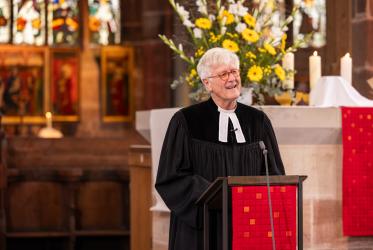The future we desire – life not destruction
Ecumenical Assembly 2014,
30 April 30 – 4 May, Mainz, Germany
Sisters and brothers in Christ, dear friends,
On the way between Easter and Pentecost,
From the empty tomb and the certainty that the power of death is broken to the feast of the Holy Spirit and new community in which justice and peace take shape as sign of God’s presence – that is the place of the ecumenical assembly in the liturgical year. My wish for all of you is that you will be moved by the joyful news of new life in Christ and that you will be motivated and transformed in the Power of the Holy Spirit.
You gather under the theme “The future we desire – Life not destruction”. It gives the direction for the way on which to discern, every day anew, what serves life and what destroys it. We know that this discernment is crucial because, every day, climate change, injustice and violence destroy the basis of life for millions of human beings and threaten the future of life on Earth.
Nevertheless, it is difficult for many to change direction and to begin with the necessary transformations of the economy, politics and life-styles. We require signposts that give hope and a community that motivates us to move forward together. I hope that your ecumenical assembly will become a sign of hope not only for yourselves, but that many will begin walking together.
A prayer that can accompany you on the way was the theme of the 10th assembly of the WCC: God of life lead us to justice and peace. The Bible speaks to us of God who created life, who in Christ overcame the sin and death that threaten life, and who gives life a future in the power of the Holy Spirit. The way in which that is shown to us is a way of love that manifests itself in justice and peace. It is promised to us in Jesus Christ that God can be found on this way wherever people suffer injustice, violence and war, yet stand up against. God is indeed our guide on the way of justice and peace.
Therefore, the delegates of the Busan assembly called on the people of our world to join God’s pilgrimage of justice and peace. I am bringing this call now to you and ask you that you begin to move now in Mainz and contribute to the pilgrimage of justice and peace. You will find companions on the way beyond the borders of your country and your continent. It needs this encompassing community of the sisters and brothers in Christ and all people of good will in order for us to move together and transform the reality around us.
The engagement for a just peace, climate justice and an economy in the service of life is surely met with strong resistance in a world of growing inequality and economic, political and military struggle for power and influence. It is not a harmless Sunday afternoon stroll, but a pilgrim road filled with serious challenges and surprises. The most important challenges are to encourage each other in prayer and worship, to learn of each other and to act together.
In this way, the pilgrimage of justice and peace is also a way for the renewal of the church – the church as community of women and men in congregations and groups together on the way, following Christ. Church as community on the way, and therefore also as institution, but not the other way round. Such a will for the renewal of the church which goes beyond itself and its boundaries is also what Pope Francis underlines again and again. The choice of Mainz for this ecumenical assembly is a clear sign that for you the way of justice and peace, and the unity of the church of Jesus Christ, belong together.
I hope that this unity will be visible in the service of life which God has given us to care for: “Avanti” – I hear Pope Francis speaking and so we find ourselves together on the pilgrimage of justice and peace. “Avanti” - it’s urgent now.
WCC general secretary
Rev. Dr Olav Fykse Tveit



